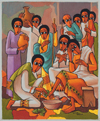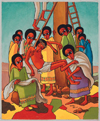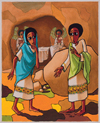Resources based on seven paintings by Nebiyu Assefa
These striking pictures by Ethiopian artist Nebiyu Assefa tell the story of Jesus’ Passion in a distinctive and moving way, and we offer them as a resource to help people of all ages engage with Jesus’ journey to the cross and beyond.
There are seven pictures, each presented with resources for meditation/reflection, sermons, talks and worship activities.
The pictures and resources can be used in a variety of ways:
- The ‘Meditation’ sections can be used to set up reflective prayer stations. They could be projected, or large prints of them could be displayed around the church, with leaflets prepared for different groups (e.g. adults, young people, children, families), guiding them through a Holy Week experience appropriate to their age or context. (Full text as PDF; pictures only as PDF or powerpoint)
- You could combine a selection of the resources into a single act of worship – e.g. for Good Friday or Holy Saturday – or use them as a basis for daily worship throughout Holy Week.
- The adult take home sheet features each picture with its related Bible reference, prompts to help you study the picture, a meditation or reflection, and suggestions for prayer.
- The family take home sheet has pictures, words and activities for families to reflect on and do together. You could look at one picture each day in Holy Week, or choose one or two to use as a focus on Good Friday.
Scroll to the end of the page to find a set of links to all the PDF and powerpoint versions of the different resources.
Artist Nebiyu Assefa's paintings feature in Joanna Brown’s book Jesus. The book interweaves the pictures with her own photos of the Holy Land to tell the story of Jesus. She links the life of Christ and his message of love and hope with her encounters with Israelis and Palestinians, and the paradoxes that she found. www.jozart.org
1 Do as I have done
Jesus washes the disciples’ feet
Based on John 13.1-15

A meditation
Prepare Place a bowl of water and a towel beside the picture.
Look Jesus washes his disciples’ feet to show them that no one is more important than anyone else.
Action Wash someone’s hands.
Reflect Are you prepared to be the least important person, or do you always want to be best? How will you show others that you love them as Jesus loves you?
Pray
for those who feel that they have
no voice or standing in society;
that you will have the opportunity
to show love and respect to others;
that those with power and authority
will use it to bring justice and peace.
Thank God for showing us how to
treat one another.
A sermon idea
Jesus challenges the disciples about their attitude to one another and authority.
What attitudes to authority exist in our context?
Is everyone treated equally?
Do the children and elderly have as strong a voice as the middle-aged?
Who is God challenging you to serve today?
A conversation idea
Show some pictures of powerful and important people today (e.g. prime ministers, presidents, politicians, or even celebrities).
Can you suggest names of other powerful or important people – and explain what makes them important?
Who are the important people in our worshipping community?
Jesus says that we need to be willing to serve one another, and that we should follow his example.
In the story, Jesus washed his disciples’ feet.
What could you do to show someone that they are important to you?
And that you don’t think you are more important than them?
A worship activity
Give everyone a 30cm piece of string.
Ask people to sit quietly, holding their string, and to think of ways that they could help other people. Invite them to think, specifically, of three people whom they could treat more kindly.
Play the song ‘Take my life, Lord’ (by Margaret Rizza), or read out the words.
Ask everyone to tie three knots in their string, one for each person they have thought of, as an expression of commitment too be kind to them this week.
Invite people to take the string home as a reminder of this commitment.
A prayer for all ages
Lord Jesus, you washed your disciples’ feet,
and you taught them to serve one another.
Help us to follow your way.
As we seek to serve you,
help us to live humbly,
seeking to serve others.
Help us to follow your way.
Teach us your attitude of love,
showing love and respect to others,
whoever they might be.
Help us to follow your way. Amen.
2 Remember me
Jesus breaks bread with his friends.
Based on Luke 22.14-20

A meditation
Prepare Place bread and wine beside the picture.
Look Jesus says, ‘Do this to remember me.’ He holds up bread and wine.
‘This is my body – given for you. This cup is the new covenant – poured out
for you.’
Action Eat a small piece of bread.
Reflect Jesus offers us bread and wine to help us remember his love for us. Will you remember? What will you remember?
Pray
for those who do not know the love
of God for them;
for those who have sad memories and
want to forget;
that they/we will remember how much God loves us.
Give thanks that God never forgets us.
A sermon idea
God showed his love for us by being willing to die.
As Jesus broke the bread, poured out the wine and shared them with his disciples he asked them to remember this, and to remember him, whenever they did this. How easy it is for us in the daily business of our lives to forget.
Explore ways of remembering during our busy weeks.
A conversation idea
Show a variety of things that help you remember people or events in your life – e.g. a photo, a mug or keepsake, a fridge magnet, a newspaper cutting.
What helps you to remember? Why do these things help you to remember – how does that work?
Jesus gave the disciples bread and wine to help them remember.
What is it that they were to remember? Why was it so important that they remember this? When we have bread and wine, how can we make sure that we remember what it is all about?
A worship activity
Prepare a simple ‘last supper’. Gather round a table on which there is a small loaf of bread and a cup of wine or grape juice (preferably using plain/rustic crockery rather than silver vessels).
Tell the story of the Last Supper once again. Pass the bread round the group and let each person break off a piece for themselves. Ask people to say ‘Remember Jesus’ as they pass the bread on.
Pass the cup around in the same way.
A prayer for all ages
Lord Jesus,
we thank you that you broke the bread.
Help us to remember you.
We thank you that you poured out the wine.
Help us to remember you.
We thank you that you love the world.
Help us to remember you.
As we gather here together:
Help us to remember you.
When we go home and out into the world:
Help us to remember you.
In all we do:
Help us to remember you.
Amen.
3 Get up and pray
Jesus is alone in the garden.
Based on Luke 22.39-46

A meditation
Prepare Place a basket of small stones near the picture.
Look Jesus asks the disciples to pray while he himself goes off alone. He is distressed. He knows he will die. In the darkness, he prays to his Father to save him; but then says, ‘not my will but yours be done’. Jesus comes back – the disciples are asleep. He challenges them: ‘Get up and pray.’
Action Take a stone from the basket and place it close to the picture.
Reflect Can you feel the emotions in this image? Can you pray in times of distress?
Pray
for those who are distressed or frightened and feel there is no hope;
for those who are alone;
for those who are trying to pray and find it difficult.
Give thanks that we can pray to God at all times, and we will be heard.
A sermon idea
Prayer was important in Jesus’ life (you could explore some examples). When do we pray? Some people pray more when things are going well, and others pray more when things are going badly. Jesus challenges the disciples to pray – and yet they fall asleep. How important is prayer to us?
A conversation idea
Imagine you were one of the disciples and you had fallen asleep after Jesus asked you to pray. How would that feel? Do you find it easy to pray? What kind of things do you pray about? Have you ever fallen asleep when you were meant to be praying? Would you have fallen asleep if your friend was as troubled as Jesus was? Why was Jesus finding it easier to pray than the disciples? What makes prayer so difficult for us sometimes? How can we help ourselves to pray?
A worship activity
Ask everyone to sit very still and quiet, either with their eyes closed or looking at the picture. Jesus asks us to watch and pray with him. What is your response? Play Margaret Rizza’s ‘Keep Watch with me’ (or similar). The music lasts for five minutes, and it is really beautiful to sit in silence for the whole of this time; however, if the group will not manage that long, you may need to fade it out.
Finish by praying together the Lord’s Prayer or the following:
Holy God, open our hearts and minds to pray.
Teach us how to stay attentive to your call.
Enable us to keep awake and alert to your presence,
even when we are tired or distressed.
Give us the words to say and the courage to say them.
We ask this in Jesus name.
Amen.
A prayer for all ages
Holy Lord, when times are hard and we don’t know what to do,
help us to pray.
When we are sad and feel alone,
help us to pray.
When we are tired and exhausted and don’t have the energy,
help us to pray.
When you are wanting us to join you,
help us to pray.
When we want to give up,
help us to pray.
Amen.
4 I do not know him
Jesus’ disciples deny knowing him.
Based on Luke 22.54-62

A meditation
Prepare Place several lit candles in front of the picture.
Look Peter follows Jesus and those who have arrested him into the high priest’s house. Peter is recognised – he’s a disciple. But he denies it. The cock crows and Jesus looks at Peter.
Action Feel the heat from the flames.
Reflect In the picture, which person is Peter? Why does he lie? How does he feel after Jesus looks at him? What would you have done?
Pray
for all who are persecuted or bullied because of what they believe;
for all Christians to have the courage to witness to their faith;
for all people who feel they have done something wrong.
Give thanks that when we make mistakes or deny God, he forgives us.
A sermon idea
Acknowledging that we are Christians is not always easy to do. Peter wanted to be close to Jesus and to see what happened, but was frightened for his own safety.
What it is that makes us not want to be honest with others about our faith?
Peter was forgiven, and went on to be a great leader of the church.
A conversation idea
What does it feel like to have people accusing you, pointing at you, picking you out?
Invite people to recreate the scene in the picture: people sitting round a fire (you could represent a fire with some red, yellow and orange material piled in a heap), one of whom is Peter; others in the background, and several people ready to accuse. Alternatively, if you have a large version of the picture (projected or displayed), sit in front as though part of it.
What would it have felt like to be Peter, facing those accusations?
Why is Peter upset when he hears the cock crowing and Jesus looks at him?
How do we know if we have done something that wouldn’t please God?
A worship activity
Give everyone a small piece of play dough. Ask people to roll their dough into a ‘perfect ball’ and then to lay it on the palm of one hand and look at it. Say, ‘God has created us and we are perfect.’
Then ask everyone to poke a finger into their dough ball and spoil it, placing the ‘messed up’ ball again on their hand and look at it. Say, ‘We make mistakes and spoil the lovely thing that God has created. We need to say sorry.’ Invite people to think of things for which they need God’s forgiveness.
Now ask people to form the dough ball into a heart shape, place it on their hand and look at it. Say, ‘God forgives us and pours his love into us, so that we end up being truly beautiful.’ Finish by thanking God for forgiving us and making us new.
A prayer for all ages
Sometimes, when our faith is challenged,
we deny that we know you.
Sometimes, when we want to be one of the crowd,
we deny that we know you.
Sometimes, when we are fearful of the consequences,
we deny that we know you.
Lord, we know that we make mistakes,
forgive us and save us.
Lord, we want to start over,
forgive us and save us.
Lord, we help us never to deny you,
forgive us and save us.
Pour your love into our lives.
Amen.
5 Women are wailing
Jesus carries his cross to the place of execution.
Based on Luke 23.26-27

A meditation
Prepare Place card or palm crosses in front of the picture.
Look Jesus is hurt from the whippings he’s had. The cross is heavy. They make Simon carry it. This is your Lord they are taking away.
Action Pick up a cross.
Reflect Imagine that you are among the crowd, watching Jesus; watching Simon as he is forced to carry Jesus’ cross. This is the one who you thought would save the world. He is going to die.
Pray
for those who are sad and mourn;
for those who are unjustly accused;
for those who are cruel and hurt others.
Thank God for the power of Jesus’ death and resurrection.
A sermon idea
The women wailed and beat their breasts. Each year we listen to the Passion story; it is easy to become anesthetised against the pain and anguish. Imagine that you were one of Jesus’ followers, following him up the hill to the place of execution. What would that have been like? What must it have been like for Mary his mother? And for the other women who were his friends? We know the outcome to this story, but they did not. Who in today’s world have lost all hope in life? What message have we for them?
A conversation idea
Look at the picture. Who is having the most difficult time – is it Jesus? Or the person trying to help him? Or the women watching helplessly? Or even the soldiers? Why might it have been difficult for each of these groups of people? In some countries, when people are deeply upset they wail and beat their breasts – what would we have done, in this country, if Jesus died today? How do we show how upset we are? How do people mourn in our own community and culture? What could we do to help help such people this week?
A worship activity
Give everyone a tealight. You could also use two large wooden planks set flat on the floor to create a cross shape, but it is not essential – the candles can just be placed in the shape of a cross. Play some quiet and sombre music. Ask people to think about what Jesus’ friends must have felt as they watched him carry his cross, and knowing that he was going to die. Invite people to come forward, to light their tealight and to place it on the cross (or on the ground to form the shape of a cross). When everyone has placed their candle, pray for all who mourn today, and for those who know that a loved one will soon die. Thank God that we are never alone, that God walks with us even in the hardest and darkest of times.
A prayer for all ages
Jesus, king of the Jews,
you carried your cross.
Jesus, lord of life,
you walked to your death.
Jesus, saviour of the world,
you died on a cross.
Jesus, God’s own Son,
your death brings me life.
Amen.
6 Immersed in death
Jesus is crucified; he is dead. He is taken down from the cross.
Based on Luke 23.44-56

A meditation
Prepare Place small strips of white cloth in front of the picture.
Look Jesus is dead. Joseph of Arimathea is ready to wrap him in a linen cloth. Mary and John are crying. You can see the wounds on Jesus’ feet and hands and side.
Action Take a small strip of cloth.
Reflect Darkness has come on all the land: darkness in our hearts, in our minds. Jesus is dead: we do not understand – he is dead. How do you feel? How do you want to react?
Pray
for people who are threatened with deathas punishment;
for those who care for the sick and dying;
for those who organise and lead funeral services, and care for the bereaved.
Give thanks for God’s love for us.
A sermon idea
Simon of Cyrene carried Jesus’ cross; Joseph of Arimathea gave Jesus a tomb and linen cloths; the women prepared spices and ointments to anoint Jesus’ body. Jesus was looked after by those who loved him. As we approach Easter, what can we do to show Jesus how much we love him? Today, he doesn’t need a linen cloth, but he does need us. What can you do?
A conversation idea
Even when Jesus was dead, those who loved him were able to care for him. What can we do to show Jesus that we love him? Theresa of Avila wrote, ‘Christ has no body here on earth but yours…’. Today, if God wants to work in the world, he chooses to do this through us. Invite people, working in small groups, to discuss what this looks like in practice. What are the ways in which God works through us? What does he ask us to do? Encourage people to think not only of big things (e.g. caring from the environment, and for other people), but also of practical and little everyday things.
A worship activity
Give everyone a bookmark-sized piece of card, and have crayons and coloured pen/pencils available. Ask people to make an Easter bookmark, drawing an image on one side of an empty cross or the empty tomb. On the other side, invite people to write (or draw) one thing that they want to do differently to show Jesus that they love him. When the bookmarks are made, invite a few people who are willing to share what they have written. Then ask everyone to hold up their bookmark, and offer a prayer that God will bless and guide everyone in doing what they have written.
A prayer for all ages
Holy God, we look upon Jesus’ death with horror;
we do not understand why he had to suffer so much.
Help us to understand.
We hear his last words as he commits himself to you;
we hear the soldier say that he was innocent.
Help us to understand.
Open our hearts and minds to understand,
so that we will not walk in darkness but in your light.
Help us to understand.
Amen.
7 I have seen the Lord
The women discover the tomb is empty tomb. He is risen!
based on John 20.11-18

A meditation
Look Mary is outside the tomb, crying. She sees two angels. ‘Why are you weeping?’ ‘They have taken my Lord.’ Mary sees the gardener. ‘Why are you weeping?’ ‘Tell me where he is.’
Jesus calls her by her name, ‘Mary.’
Mary recognises him, ‘Teacher!’
He says, ‘Go and tell.’
Mary runs, ‘I have seen the Lord!’
Action Turn to someone, grasp their hands and say: ‘Christ is risen!’ If it is said to you, reply: ‘He is risen indeed!’
Reflect If you had been with Mary in the garden, what would you have done?
Pray
for those who are sad and troubled today;
for those who have good news to share;
for all Christians that they will share the good news of Jesus.
Thank God for the whole Easter story – and that Jesus rose from the dead.
A sermon idea
Mary recognised Jesus’ voice. She knew that it was him by the way he called her by name. God calls each one of us by name, do we recognise him? The good news of Jesus’ resurrection is to be shared with others, but how can we do that if we have not heard our own personal calling?
A conversation idea
Mary has seen angels. She has seen that the tomb is empty. But she doesn’t realise the truth of who Jesus is until he calls her by name. How do we hear God speaking to us today? Tell a story about how you or someone else has been guided recently by God. Invite people to share, in twos and threes, how they might listen to God. How does God speak to us? Look at the picture . Imagine that Jesus is standing right next to you. He calls you by your name. He tells you to go and tell the good news to others. What good news are you going to go and tell?
A worship activity
God knows us all by name. Ask people to stand up, a few at a time, all over the worship space; as they stand a leader/minister calls out their name. (This works best if people stand fairly quickly after one another.)
Sing or listen to the song ‘I heard the Lord call my name, listen close you’ll hear the same’ (or a suitable alternative; e.g. the chorus only of ‘I the Lord of sea and sky’). If you don’t know the song, there is a version on YouTube sung by Mary & the Disciples, endorsed by the writer.
End with this prayer:
Lord God,
thank you that you know us each individually.
You call us by our name and want us to follow you.
Help us to recognise your voice.
Gives us the courage to obey you.
Help us to share the good news that you are alive.
Amen.
A prayer for all ages
Holy God,
on that first Easter morning, Mary came to the tomb.
She did not know.
Help us to know.
On that first Easter morning, Mary spoke to two angels.
She did not understand.
Help us to understand.
On that first Easter morning, Mary did not, at first, see Jesus.
Help us to see
On that first Easter morning, Mary recognised Jesus’ voice.
Help us to recognise his voice.
On that first Easter morning, Mary ran to tell the good news.
Help us to tell the good news.
Amen.
(See also The Passion of Christ - Children & Young People resources)